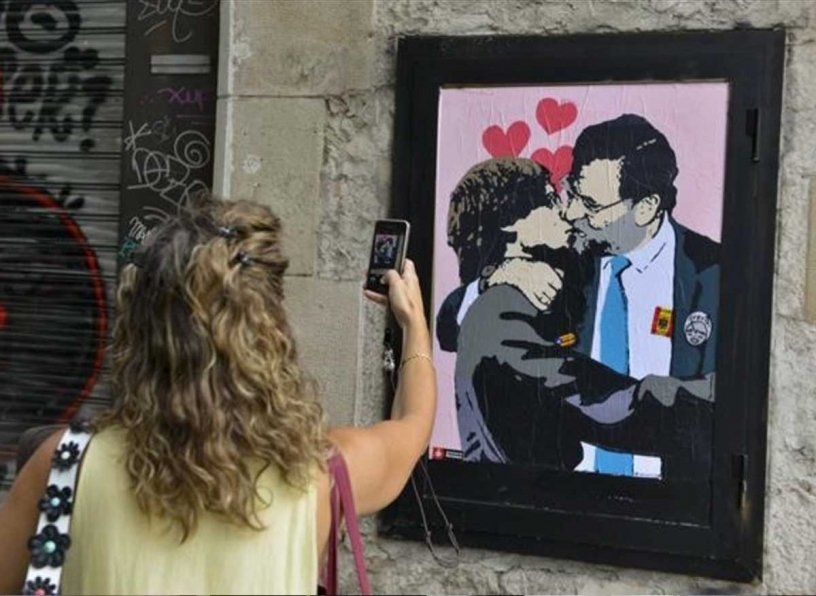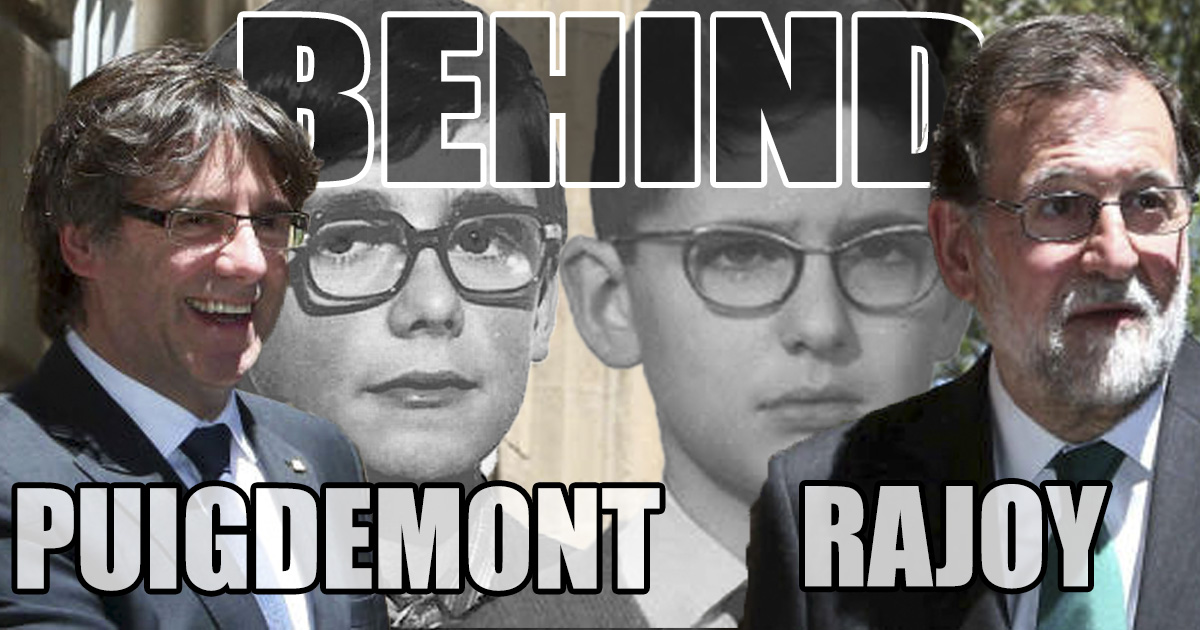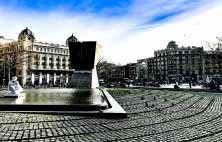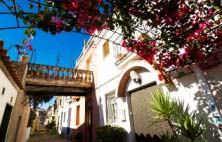In the last days and weeks, we are witnessing something similar to a boxing match. We are seeing hooks from left and right, from one side to the other, in the form of statements and ultimatums. At on side of the ring is Mariano Rajoy, head of the Spanish government since 2011, and on the other, Carles Puigdemont, head of the Generalitat.
Since January 2016, this struggle involving Catalonia and Spain is getting more and more complicated every day and neither side wants to throw in the towel. So to understand everything a little better, we try to see who the two men have been, throughout history, who lead the “yes” and “no” to Catalan independence.
Mariano Rajoy: The law in his blood, the power in his hands
The ugly duckling of the family
Born in 1955 to a family of lawyers in Santiago de Compostela, Mariano Rajoy Brey grew up in Galicia and studied law there. The young Rajoy had never been very bright in school according to his grades, often demonstrating lower than averages results. However, after he finished studying in 1979, he managed to become a property registrar, becoming the youngest person to hold such a position in this profession in Spain.
Not following in the footsteps of his father and grandfather, he left law to get into politics and joined the ‘Alianza Popular’ (AP), a right-wing party, predecessor of the Partido Popular (PP) founded by the former minister Manual Fraga. Despite all of this, his studies would come to reflect the way he does politics, and especially, in his obsession with respecting the law. Many criticise, in particular, his priority for the Civil Code before any emotion. This gives him the image of being a boring man.
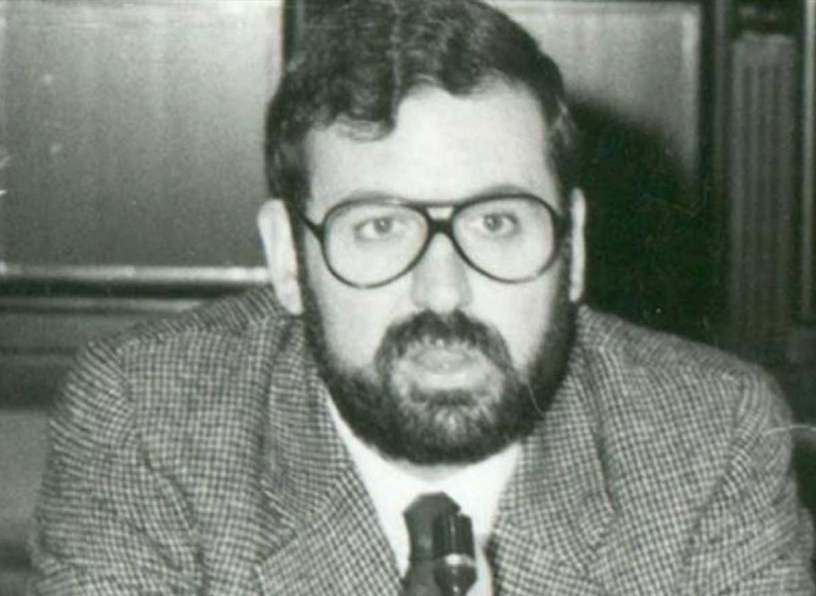
From regional member of parliament to leader of the PP
At 26 years old, the Galician became a member of parliament in the region of Pontevedra. However, Rajoy is not silly and quickly positioned himself in a place together with the powerful man of the PP, José María Aznar. In 1996, when the Partido Popular won the general elections, Aznar appointed Rajoy as Minister of the Hacienda and subsequently as Minister of Culture and Education.
Throughout the years, Aznar moved ever closer to the point where in the year 2000, the President of the Government elected him as vice-president and then as Minister of the Interior (Home Office). In December 2003, Rajoy took on the role of leader of the Partido Popular, which surprised a great number of members of the party. But the elections that followed his appointment as leader were not successful and the PP lost to the opposition in 2004.
A survivor
In 2005, the president of the PP was victim to a helicopter accident with Esperanza Aguirre, filmed and transmitted by numerous television programmes. Rajoy survived with only minor bruising.
Some positions already defined in Catalonia
Mariano Rajoy, then leader of the opposition, did not hesitate to strongly criticise the acts and actions of the Socialist government of Zapatero. In particular, regarding Catalonia, at the time of the adoption of the Statute of Autonomy of the region in 2006. The PP, led by himself, led a media campaign against this, which cost the party no less than 500,000 Euros. Despite getting 4 million signatures in favour of the resignation of the Government, this action ended up being a failure for Rajoy.
The same happened in the following elections in 2008, after which the PP, destroyed, organised an important reorganisation within the party. Rajoy still remaining the head of the party, he was re-elected with 79% of votes from his party. His determination was rewarded in the forthcoming general elections in which the PP won with 44% of the votes. With this, Rajoy became president of the government in 2011.
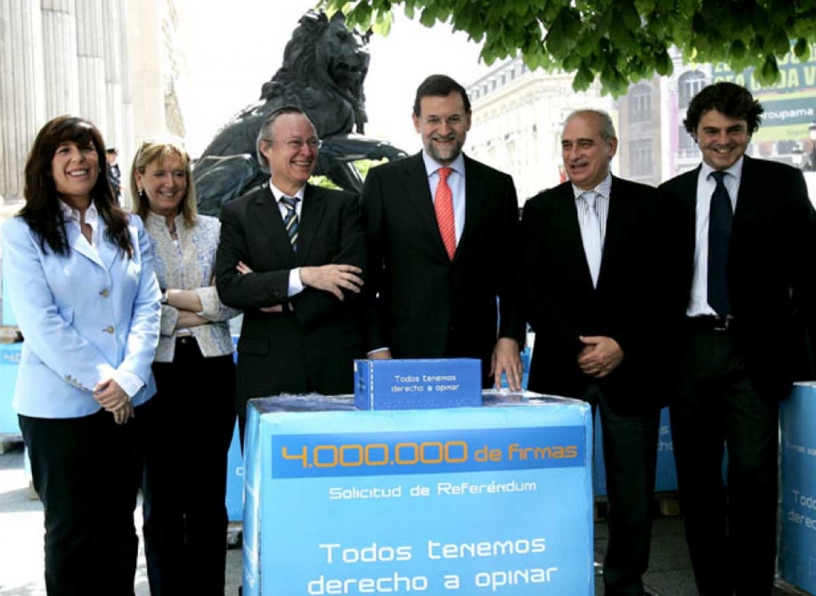
Corruption scandals
Mariano Rajoy is involved in a series of corruption scandals revealed by various media. They are already attracting the attention of the population for their position on abortion and same-sex marriage, but there is also evidence of payment of “bonuses” and donations from entrepreneurs to certain party positions, including himself. Even though Rajoy denies everything, the petitions requesting his resignation are strong. And yet, he comes out successfully and the Galician continues to cling onto his position.
The campaign of 2015, a real blow for Rajoy
While the president is running for a second term and campaigning for the 2015 parliamentary elections in Spain, Rajoy is assaulted during an appearance. A child of 17 years old punches him and he loses his glasses, leaving him with a big red mark on his face.
Finally, these elections end up lengthening over the account. The emergence of new parties and the lack of agreement between them means that the Partido Popular, despite having obtained a majority at the polls, will not have sufficient strength to form a Government within Parliament. So new elections were called. The result is similar, but this time it gets an agreement with the Partido de Ciudadanos and the abstention of the PSOE. This is done again with the presidency of the Government in 2016 and until this day.
Father with a passion for football
Rajoy, despite holding the position of President of Spain, has managed to maintain a relatively good private family life. He got married in 1996 to Elvira Fernández Balboa, who worked for the television programme Antena 3 and has two children, Mariano and Juan. The leader of the PP is a big sports fan, especially football. His team is Real Madrid.
In the following video, we can see him with his son in a radio interview. The boy makes some negative comments about a video game and Rajoy gives him two slaps on the back of the head.
Carles Puigdemont: The conductor of the independence orchestra
His beginnings as a journalist
Carles Puigdemont, born in 1962 in Amer, a town in Girona at the foot of the Pyrenees. Puigdemont decided to begin his studies in philosophy a the University of Girona after the boarding school he was sent to at age 9. Once he had finished his studies, he focused more on journalism rather than on his fathers and grandfathers bakery. Like Rajoy, he diverted from the family path.
Initially, he was a correspondent in his home town for the newspaper Los Sitios, then later, he was contracted for the newspaper El Punt. He began as an editor in 1982 and later became editor in chief.
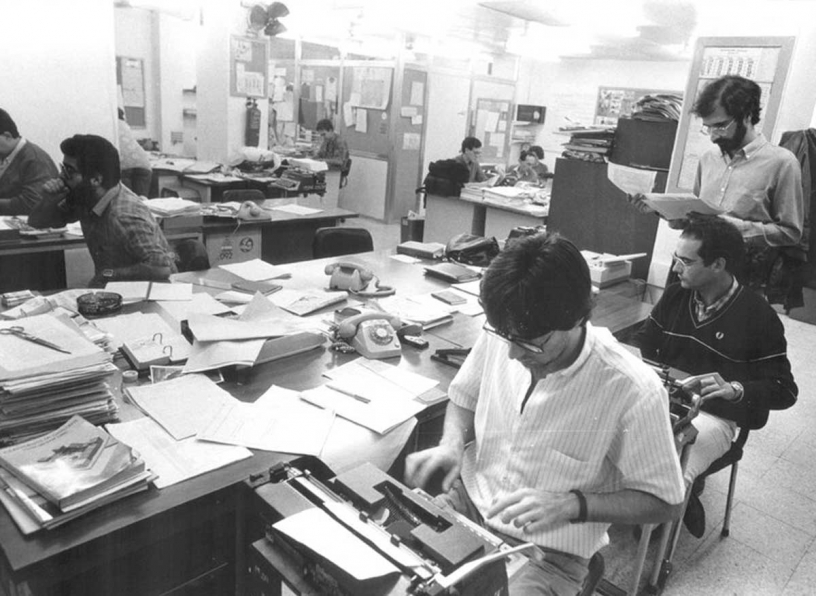
A true lover of Catalonia
Leader of the independence movement says that as a child he did not find any Catalan flags in Amer, his town, so he asked his grandmother to weave one. This love for his region led him, throughout his journalism career, to have strong interest in the international image of Catalonia.
This interest grew in 1994 when he published a book called “Cata … què?” In it, he brings together different articles from around the world and shows the ignorance internationally towards his land. In 1998, he created his own news agency entirely dedicated to Catalan news which he called the Agency of Catalan Information. But he does not stop there and continues his conquest to change the media by participating in the creation of the first Catalan newspaper in English. Catalonia Today.
His first steps in politics
Despite having opted for a career in journalism, Puigdemont has always kept a foot in the political world. He joined the Nationalist Youth of Catalonia, to the youth section of the Democratic Convergence of Catalonia party (CDC) and was also always an active person in the search for solidarity towards defending the language, culture and Catalan nation.
It wasn’t until 2006 when he entered the Catalan parliament, surprising a great number of his colleges, while opposing the municipal government of Girona. In 2011, he was elected mayor of the city, putting an end to 32 years of socialist government.
Anecdote: In 1991, Puigedemont made a campaign for the city of Gerona (Spanish name) to take the name Girona (Catalan name).
If you come to visit the capital of Catalonia, we will help you to find the best apartments in barcelona city centre. We offer apartments of different types, renovated and well furnished in all areas of Barcelona!
Involvement in several judicial cases
In 2012, while still a member of Parliament and Mayor of Girona, he was accused by the state attorney of using public money for personal use. In fact, Puigdemont, during the event “Catalunya, nou estat d’Europa” (“Catalonia, new European state), was able to book tickets in RENFE, a company that manages Spanish trains, to allow the arrival of the participants of the movement.
However, this is not all. In 2015, the Audencia Nacional (special and exceptional high court in Spain) opened an investigation regarding the support of the Girona City Council, which Puigdemont was in charge of, to the resolution of the Catalan Parliament on the launch of the independence process. But these two cases did not prevent the great lover of Catalonia from being re-elected as Mayor of the city in 2015.
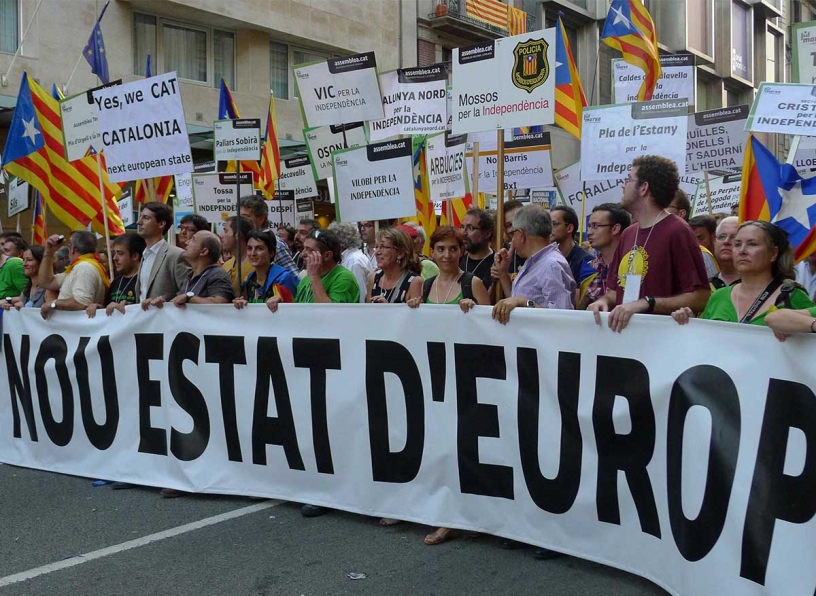
A new president for Catalonia determined to achieve independence
On 10 January 2016, when Artur Mas fails to be re-elected for the third time as President of Catalonia, this latter announced the withdrawal of his candidacy in favour of Carles Puigdemont, who became the new president of the Generalitat. He admitted to having come to power “accidentally, at the last moment and through the back door” in an interview with the New York Times. He took up office in the same way with the program of independence initiated by his predecessor.
The number one Catalan is described by a journalist friend as a very stubborn person. It is not surprising then that the aim of the former Mayor of Girona, on his arrival at the head of the Generalitat, has not changed since then and today he fights against Madrid with no barriers to get what he has always wanted: the independence of Catalonia.
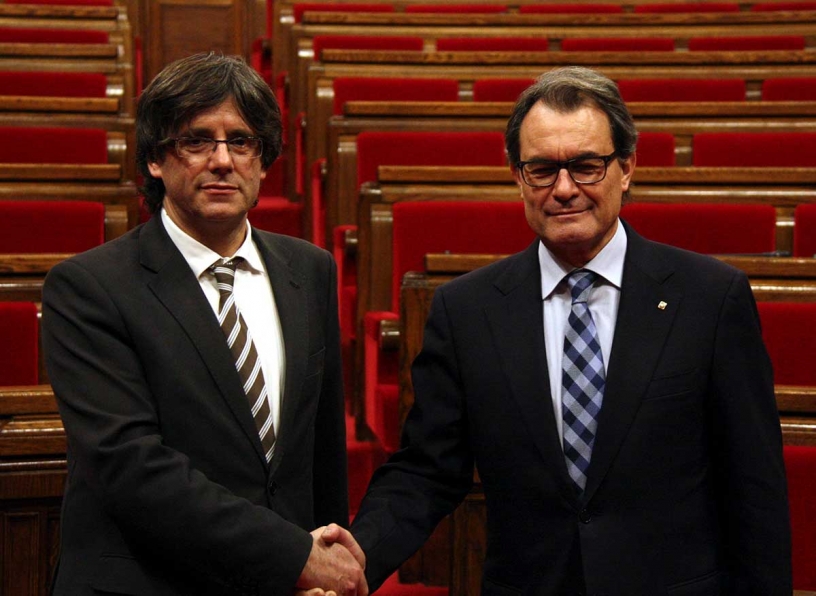
The fifth Beatle
The president of the Generalitat has been called the “fifth Beatle” by several Spanish medias. Although at first sight, you may think that it’s because of his hair cut, but in reality, his hair is to hide the scars that a serious traffic accident left him with. This nickname hides a reality less well-known by the general public.
Carles Puigdemont is a big music fan. He declared in an interview that he could never give up music, even believing that he could have been a musician rather than a politician. As a teenager he had his own band. Today, he is, of course, totally dedicated to his role as president of Catalonia, but without a doubt you will catch him playing his guitar, as you can see in the following video, playing with the Catalan group ‘Sopa de Cabra’, or Goat Soup in English.
His first family
It was at a theatre festival in 1998 when Puigdemont met his wife and the mother of his two daughters, Marcela Topor. His Romanian wife, who is a journalist gave him two daughters, Magali and María.
Puigdemont is very close to his family, who are his first priority. The President of the Generalitat does not live in Barcelona in the house reserved for him, but almost every night, in these moments of crisis, in his house in Girona with his family.
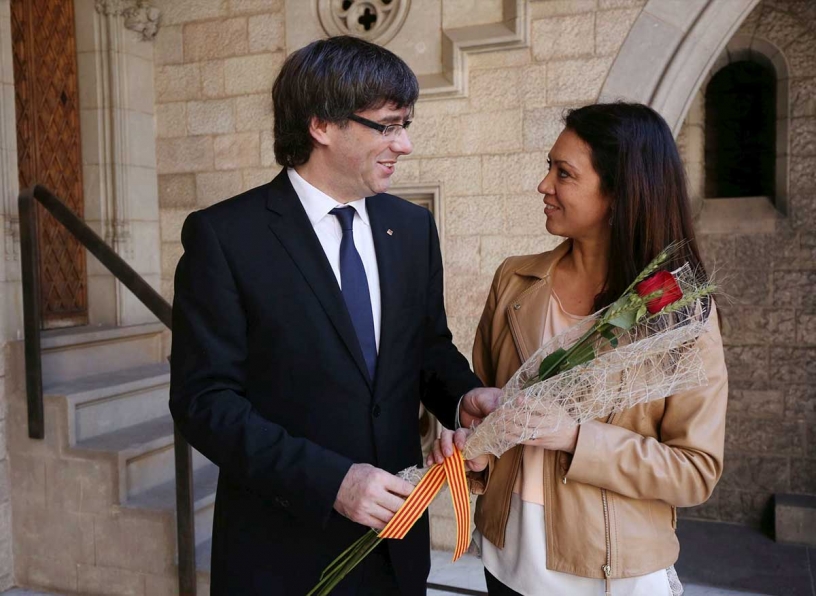
Excursions in Barcelona
To make the most of Barcelona and fill your trip with unforgettable experiences and emotions, we offer you the excursions through the Catalan capital organized by our friends - the GetYourGuide team. Choose your excursion and fall in love with Barcelona:
The best enemies in the world
As you will have noticed, it is not difficult to find similarities between the two men that, in another context, could have got along. But ironically, the Spanish and Catalan president share a similar determination, both are stubborn. It is not surprising, therefore, that we have reached this situation which we are living in, since the concessions are not the strength of these two politicians.
Currently, the two are kicking the ball back and forth. One wants the other to stand down and the other wants the same but vice versa. In short, a real dialogue of the deaf. A dialogue carried out over a distance. The two presidents have only met once, in the only interview in 2016 during which Rajoy gave the President of the Generalitat a gift.
This gift was the first edition of the second part of the Don Quixote. This gesture could be interpreted in different ways. In this part, Don Quixote of La Mancha goes to Barcelona to see the sea for the first time. But beyond this symbolic choice, it sends the President of Catalonia a clear message, Rajoy is compared with the famous Hidalgo taken by a gentlement whose vision is not strong and that fights against the wind. A quest probably as vain in the eyes of the Spanish president as that of the independence of Catalonia directed by Puigdemont.
